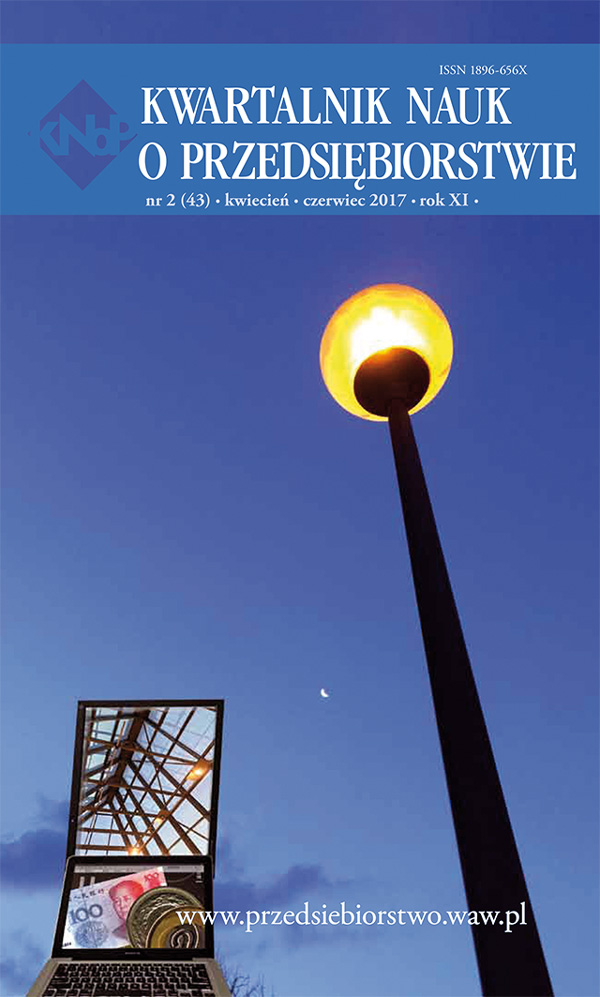Jeremy Rifkin’s utopia of the economy of abundance
Main Article Content
Abstract
The article is a voice in the discussion on the directions of the evolution of the global economy. The reference plane is a reflection J. Rifkin's book titled: The Zero marginal Cost Society. The article critically analyzed some of the assumptions and conclusions contained in the work of Rifkin. The main topics of discussion included the reality of such principles as the need to reduce the human population, or total elimination of intellectual property rights. On the other hand, the dubious trends was inter alia dominance of communities production in the world economy already about half the twenty-first century. Also pointed to issues relevant to the future development strategies completely omitted in the work of Rifkin.
Downloads
Article Details
The author of the article declares that the submitted article does not infringe the copyrights of third parties. The author agrees to subject the article to the review procedure and to make editorial changes. The author transfers, free of charge, to SGH Publishing House the author's economic rights to the work in the fields of exploitation listed in the Article 50 of the Act of 4 February 1994 on Copyright and Related Rights – provided that the work has been accepted for publication and published.
SGH Publishing House holds economic copyrights to all content of the journal. Placing the text of the article in a repository, on the author's home page or on any other page is allowed as long as it does not involve obtaining economic benefits, and the text will be provided with source information (including the title, year, number and internet address of the journal).
References
Coase R.H. [1946], The Marginal Cost Controversy, “Economica”, Vol. 13, No. 51, August 1946.
Elkind D. [2011], Empathic Civilization: How Little Minds Are Wired For Compassion, “Huffingtonpost”, 05/01/2010, updated May 25.
Gloger Z. [1985], Encyklopedia staropolska, t. II, Warszawa, Wiedza Powszechna.
Hardin G. [1968], The Tragedy of the Commons, “Science”, December, 1968, No. 162 (3859).
Hotelling H. [1938], The General Welfare in Relation to Problems of Taxation and of Railway and Utility Rates, “Econometrica”, Vol. 6, No. 3.
Jezierski A., Leszczyńska C. [2003], Historia gospodarcza Polski, Warszawa, Wydawnictwo Key Text.
Mandeville B. [1705], Ul Malkontent czyli łajdaki umoralnione. Bajka o pszczołach, London 1705/1714. (przekład polski: W. Chwalewik).
Pretty J.N. [1990], Sustainable Agriculture in the Middle Ages: The English Manor, “The Agricultural History Review”, Vol. 38, No. 1.
Rifkin J. [1995], Koniec pracy. Schyłek siły roboczej na świecie i początek ery postrynkowej, Wrocław Wydawnictwo Dolnośląskie, 2001, 2003. Wydanie oryginalne: The End of Work: The Decline of the Global Labor Force and the Dawn of the Post-Market Era, New York, G P. Putnam’s Sons, 1995.
Rifkin J. [2016], Społeczeństwo zerowych kosztów krańcowych. Internet przedmiotów. Ekonomia współdzielenia. Zmierzch kapitalizmu, Warszawa, Wydawnictwo Studio EMKA.
Sedláček T. [2015], Ekonomia dobra i zła. W poszukiwaniu istoty ekonomii od Gilgamesza do Wall Street, Warszawa, Wydawnictwo Studio EMKA.
The 100 largest governments and corporations by revenue [2015], August 27, http://www.corporationsandhealth.org, dostęp 27/08/2015.
USDA [2012], Census of Agriculture 2012, United States Summary and State Data, Vol. 1, Geographic Area Series, Part 51 AC-12-A-51, Issued May 2014.

